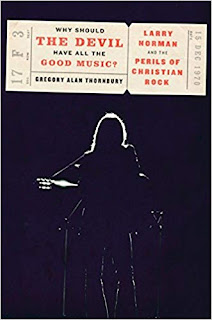Provoking radical
fidelity
Why Should the Devil
have all the Good Music?
Larry Norman and the
Perils of Christian Rock
Author: Gregory Alan
Thornbury
Publisher:
Convergent Books
Pages: 292
Imagine being given
unlimited access to the papers and archives of an artist that you
have listened to for many years. One of the fascinations of Why
should the Devil Have All the Good Music? is what Gregory Alan
Thornbury chooses to include. So much could be said! Then there is
the challenge of what to make of it. The peaks! The valleys!
After watching the
documentary Fallen Angel: The Outlaw Larry Norman, where
Norman gets “shot down,” I was crestfallen. Even here, the
reminders of indiscretions resurrected those dark feelings that like
ghosts haunt me once again. Nevertheless, I am thankful to get an
alternative view to Norman’s life,
one that feels more balanced.
If that is not
reason enough to read this, the writing is superb; the thought
incisive. The Norman estate made the right choice in opening the
vault to this author. So much of the history of Jesus Music is here,
which makes this essential reading for any interested in the
intersection of faith and rock. It’s utterly fascinating.
Even though some of
Norman’s dreams and visions were never fully realized, it’s a
pleasure to behold his more noble ambitions. If as some say, God
gives credit for right aspirations, Norman must have gained
commendation. Despite the ways that he fell short, as we all do, his
goals pointed him toward praiseworthy ends. It’s something that I
needed to see in light of Fallen Angel.
In Another Land
was my introduction to Norman’s recordings. By the time that I
made my way to So Long Ago the Garden, I was still new to the
Christian faith, having more zeal than knowledge. After the
straightforwardness of Another Land, I was perplexed by
Garden. Why so few overt
Christian references? Reading about the background and aftermath of
this release enables me to see that Norman was badly misunderstood
and judged. It make me think of the quotation on the back of the dust
jacket, “I was both happy and unhappy to have Larry Norman’s
earthly arc fully explained. How the hell did he survive all that?”
(Black Francis, songwriter and lead singer of Pixies). I am grateful
for the explanations, but sorry that I was among those who questioned
Norman’s judgment on this controversial release.
An
insight from Norman
sheds light on what is
a long time coming among Christians:
Music is a powerful language, but
most Christian music is not art. . . . It never relies on—in
fact it seems to be ignorant of—allegory,
symbolism, metaphor, inner-rhyme, play-on-word, surrealism, and many
of the other poetry born elements of music that have made it the
highly celebrated art form it has become (98-99).
As
a new Christian, uneducated about the world of art, I had no concept
of the elements described by Norman. Fortunately, over the years
there has been more instruction on theology and the arts. Otherwise,
like the proclamation of the gospel, how can we know unless someone
tells us?
This
book does not try to reconcile the contradictions—something
only God can do. It’s aim, like Norman’s ministry, is to provoke
an encounter leading to radical obedience. Curiosity, superficial
engagement and maintaining the status quo are insufficient. Norman
was aiming at an authentic following of Jesus.
Perhaps
Norman’s life is a reminder that we dare not miss this pursuit.
What
we get right or wrong is of little consequence in
comparison.
The
world needs to see more
of Jesus
in the life of his followers.
I
think Norman will be pleased if the totality of his life inspires
toward this end. So if you read this book and/or listen to Norman’s
recordings, think about what it means for
Jesus to be the way, the truth and the life.




